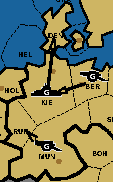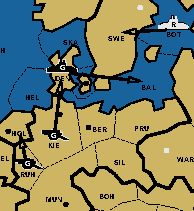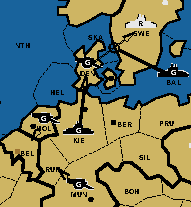
([email protected])


Germany is my favourite country to play. Apart from the obvious reasons of the tight knot of supply centers and the ability to explode in any chosen direction, something about the black pieces really appeals to me.
In 1992, at World DipCon in Canberra, Australia, an eccentric Frenchman played Germany in a game in which I was Russia, and he pulled off an opening that left me gasping for air. I can only remember the rest of the game vaguely, but I'll never forget how I felt when I saw the black menace move in 1901. I don't know whether the opening has a name, or who might have invented it, but I've used it since and have delved into the negotiations and mindset required to make it work. I have not seen the moves discussed in any articles on the web, so I hope to make a contribution with these writings.
My first piece of advice is: Draw Germany. What I'm about to discuss just won't work with any other nation.
Okay, so now you're Germany. Who says you have to get involved in a full-on western war? Don't fall into the mindset that says that you must choose an enemy from either England or France then enlist the other to be your partner. You've got to be very balanced with your two neighbours here. Ideally, get them fighting each other and get involved on a minor level. Sometimes (depending on the ability of the players you face) an EFG can work. It's a balance thing. A good Italian player will keep an average French player busy without getting major gains, although France is the one with whom you will eventually seek alliance. An average English player may not appreciate that he has to choose another victim once St. Petersburg is captured. Your call. I usually work to get them bouncing in the channel.
Know what is going on around you also. The old "central powers stick together" motto will usually give you honest appraisals from Austria and Italy. If you can get Austria or Turkey antagonistic to Russia, this is good -- but an A/T alliance proper is not. If Russia is under pressure elsewhere, he is going to be forced to agree with your plans.
Now, how to handle the Russian? Be friendly and receptive. Don't offer alliance -- that always smells fishy to a Russian. Rarely do R/G alliances form, or if they do are not long lived. Simply do the usual -- DMZ Prussia and Silesia and promise Sweden. Say you are going to Denmark from Kiel, but that you will definitely allow Russia to pick up Sweden (after all, maybe you two can co-operate against England). Make sure Austria and/or Turkey deny Rumania to the Russian.

Your Spring 1901 moves are completely neutral:
Fleet Kiel to Denmark
Army Berlin to Kiel
Army Munich to Ruhr
Everyone on the board now says: "Ah, a sensible German player. Didn't do anything crazy," and they will all be likely to trust you somewhat.
Let France and England know that you're having a crack at 3 builds. You're after Belgium. Now this may cause some dissension and the cries of "Germany on six at the end of 1901! That's too dangerous" and cause a consortium to form against you. So be very careful. If England and France have bounced in the channel in 1901 and no French army is in Picardy or Burgundy, you don't have to say anything -- they can't get Belgium (well, England can, but if he's uncertain about you he'll definitely go for Norway). The point is, if you can make them both think it's pointless to try for Belgium and that their units have other things to do, that is good. Let them know that if they leave Belgium to you, you'll look very favourably upon allying with either of them.
Restate to Russia that Sweden is his. Hopefully, you can see that Rumania will not fall into Russian hands and that at least someone in the south is anti-Czar.
At this stage you haven't done anything to upset anyone else, and if things look like your plans will be upset, you can pull out without anyone being the wiser. Plus you could get three builds.
Here it is necessary to raise the subject of "limited conflict". Just because you take a center from someone, it doesn't mean that you are at full scale war with them -- especially if this center is a neutral. Home centers are somewhat different -- stealing them usually generates a rather nasty response. But a neutral that hasn't been held for long can be a different story. Get your head around it because you have to sell this to the Russian after this move. And you have to believe it -- because, in the words of George Castanza, "If you believe it Jerry, it's not a lie." And in all probability it is not a lie either (but keep your options open).

Your Fall 1901 moves are:
Fleet Denmark to Baltic Sea
Army Kiel to Denmark
Army Ruhr to Holland
Ay caramba! Now it's nasty. Now you see why Russia must be under pressure elsewhere. You have just overtly stated your intention to annex Sweden in Spring of 1902. And that is what you're going to do.
Hopefully you have orchestrated continuing conflict between France and England. Because now you're going to choose the French side. Build a fleet in Kiel and an army in Munich (this will make Russia a bit happier with you). Aim to annex Belgium also in Spring 1902.

Your moves could be thus:
Fleet Baltic supports Army Denmark to Sweden
Army Denmark to Sweden
Fleet Kiel to Denmark
Army Holland to Belgium
Army Munich to Ruhr
So if you've worked hard, pulled out some aces, and have been just downright lucky, you could have a Fleet in the North Sea at the end of 1902 and be up to seven units. Enough to handle England yourself.
In 1903 you should plan to capture Norway (with or without Russian help; BAL-Swe and Swe-Fin should do the trick) and have a good balance of fleet and army power. Once you've participated in a dissection of England, other circumstances will dictate your next victim -- why, it could be your long suffering Russian friend; after all it's not fair to keep them suffering so long.
As with all opening strategy in Diplomacy, you have six wild cards that ultimately influence the success of your plans -- the other six players. The best laid plans can come unstuck at the most crucial times, but I think this opening is worth it purely for the Fall 1901 shock value.

|
Tony Swinnerton ([email protected]) |
If you wish to e-mail feedback on this article to the author, and clicking on the envelope above does not work for you, feel free to use the "Dear DP..." mail interface.

